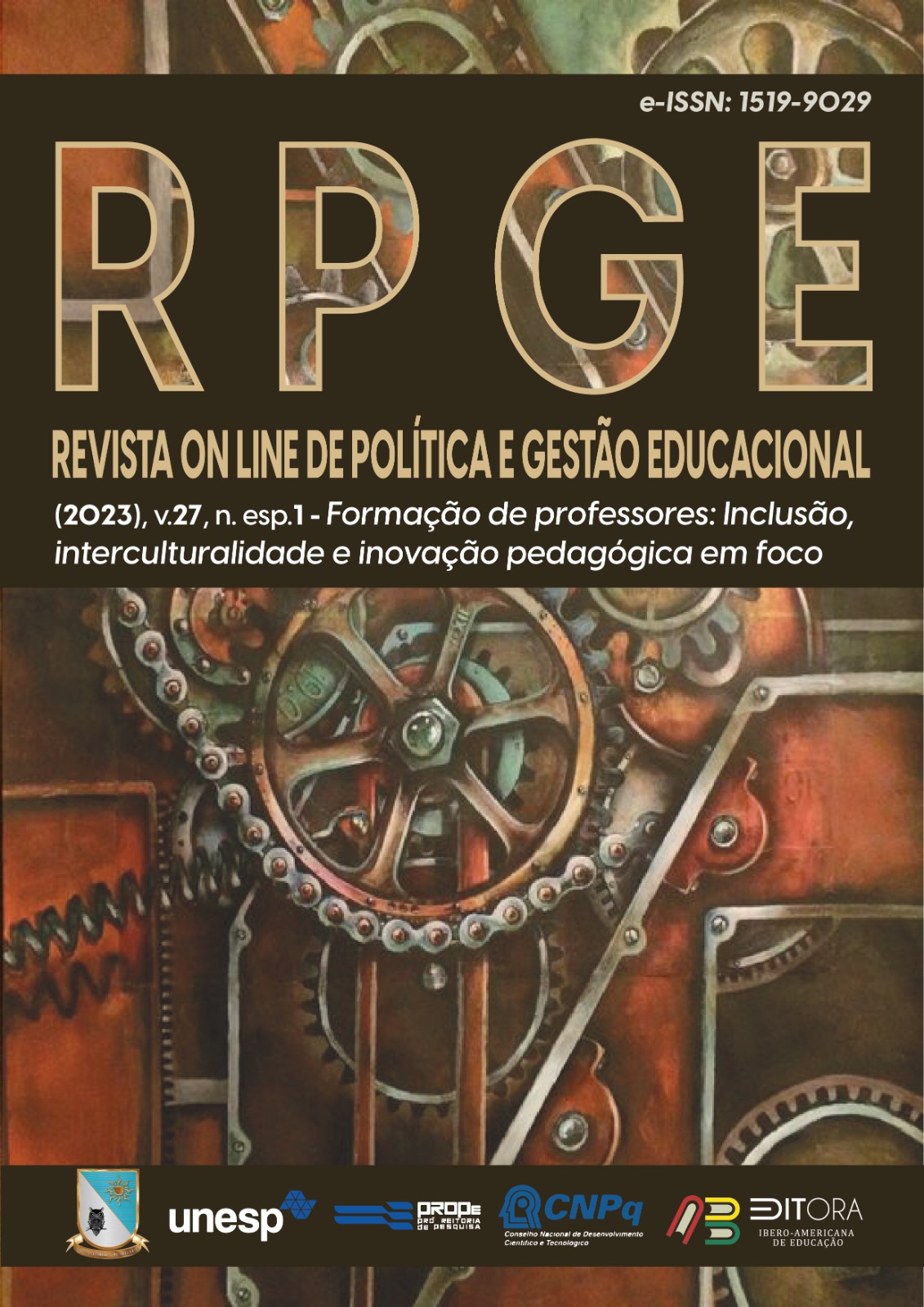Reflexões sobre a docência intercultural e inclusiva à luz das epistemologias de Freire e Maturana
DOI:
https://doi.org/10.22633/rpge.v27iesp.1.17928Palavras-chave:
Formação de professores, Inclusão, Interculturalidade, Paulo Freire, Humberto MaturanaResumo
Neste ensaio discutiremos docência intercultural e inclusiva à luz das epistemologias de Freire e Maturana. Como Metodologia, seguiremos um percurso de construção teórica e aproximações semânticas dos conceitos de interculturalidade e de inclusão, como uma contribuição à discussão sobre formação docente. Na continuidade, mostraremos que tanto a cultura, quanto a interculturalidade podem ser pensadas como redes linguísticas nas quais estão entrelaçadas o linguajar e o emocionar. O conceito de inclusão será discutido no âmbito mais geral das questões éticas, por acreditarmos que a aceitação do outro, enquanto legitimo outro, na convivência, é mais uma questão emocional do que racional. O realce às emoções e, no âmbito destas, o amor e a ética, enquanto preocupação com as consequências de nosso atuar sobre outros seres humanos, é fundamental para nossa análise, particularmente neste momento de ressurgimento da cultura do ódio e dos embates no campo dos direitos humanos e da educação inclusiva.
Downloads
Referências
ANDRADE, L. A. B. Paisagem conceitual: construção teórica e o seu uso na educação. RevistAleph, v. 32, p. 178-199, 2019. Disponível em: https://periodicos.uff.br/revistaleph/article/view/39313. Acesso em: 10 jun. 2022.
ANDRADE, L. A. B.; SILVA, E. P. Dialética, diálogo e conversa: consonâncias e dissonâncias epistemológicas entre Freire e Maturana. Revista Educação Brasileira, n. 55, v. 27, p. 51-77, 2005. Disponível em: http://www.biolinguagem.com/ling_cog_cult/andrade_silva_2005_dialetica_dialogo_conversa.pdf. Acesso em: 10 jun. 2021.
BOSI, A. A Dialética da Colonização. São Paulo: Cia. das Letras, 1992.
BLOIS, M. M. Reencontros com Paulo Freire e seus amigos. Niterói, RJ: Fundação Euclides da Cunha, 2005.
ECKHARDT, K.; ANDRADE, L. A. B. Um olhar sobre a inclusão sociodigital de pessoas da terceira idade a partir do Telecentro Helena Tibau. 7. ed. Niterói, RJ: Pontos de Vista, 2021.
EICHEVERRIA, R. La ontologia del lenguage. Santiago: Dólmen ediciones, 1994.
FREIRE, P. Educação como prática da liberdade. 4. ed. Rio de Janeiro: Paz e Terra, 1974.
FREIRE, P. Conscientização: teoria e prática da libertação. São Paulo: Ed Moraes, 1980.
FREIRE, P. Pedagogia do oprimido. 18. ed. Rio de Janeiro: Paz e Terra, 1987.
FREIRE, P. Pedagogia da esperança: Um reencontro com a pedagogia do oprimido. 2. ed. Rio de Janeiro: Paz e Terra, 1992.
FREIRE, P. Pedagogia da autonomia: saberes necessários à prática educativa. São Paulo: Paz e Terra, 1996.
FREIRE, P. Extensão ou comunicação? 12. ed. Rio de Janeiro: Paz e Terra, 2002.
GOODENOUGH, W. H. Cultural Anthropology and Linguistics, Bobbs-Merrill Reprint, Series in Language and Linguistics, L 29, 1957.
HADDAD, S. O educador: um perfil de Paulo Freire. São Paulo: Editora Todavia, 2019.
KLUCKHOHN, C. K. Universal Categories of Culture, in Anthropology Today. Chicago, 1953.
LIMA, A. N. B. et al. Inclusão sociodigital e formação humana: caminhos para a construção de uma política pública em Niterói. RevistAleph, ano 13, n. 26, p. 14-28, 2016. Disponível em: https://periodicos.uff.br/revistaleph/article/view/39147/22584. Acesso em: 12 ago. 2022.
MATURANA, H. El sentido de lo humano. Santiago: Ediciones Pedagógicas Chilenas,1992.
MATURANA, H. A ontologia da realidade. Belo Horizonte: Editora UFMG, 1997.
MATURANA, H. O que se observa depende do observador. In: THOMPSON, W. (org.). Gaia – Uma teoria do conhecimento. São Paulo: Editora Gaia, 2000.
PEREIRA, R. Diversidade funcional: a diferença e o histórico modelo de homem-padrão. Hist. cienc. saúde-Manguinhos, Rio de Janeiro, v. 16, n. 3, p. 715-728, 2009. Disponível em: https://www.scielo.br/j/hcsm/a/9d7FrYfH46n8V9JPwGcQVTf/?lang=pt. Acesso em: 12 jun. 2022.
TYLOR, E. B. Primitive Culture. London: John Murray, 1871.
VIANNA, B.; ANDRADE, L. A. B.; VAZ, N. M. Ensinar é impossível, e aprender, inevitável: comentários sobre a epistemologia de Humberto Maturana. HELIUS, v. 3, p. 1183-1227, 2020. Disponível em: https://helius.uvanet.br/index.php/helius/article/view/158. Acesso em: 10 jun. 2022.
Downloads
Publicado
Como Citar
Edição
Seção
Licença
Copyright (c) 2023 Revista on line de Política e Gestão Educacional

Este trabalho está licenciado sob uma licença Creative Commons Attribution-NonCommercial-ShareAlike 4.0 International License.
Manuscritos aceitos e publicados são de propriedade da Revista on line de Política e Gestão Educacional. É vedada a submissão integral ou parcial do manuscrito a qualquer outro periódico. A responsabilidade do conteúdo dos artigos é exclusiva dos autores. É vedada a tradução para outro idioma sem a autorização escrita do Editor ouvida a Comissão Editorial Científica.











